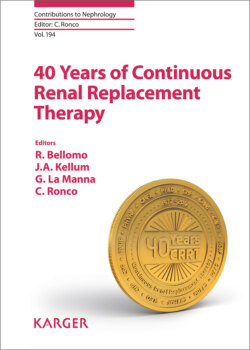Читать книгу 40 Years of Continuous Renal Replacement Therapy - Группа авторов - Страница 7
На сайте Литреса книга снята с продажи.
Preface
ОглавлениеForty years ago, Peter Kramer in Gottingen treated the first patient with continuous arterio-venous hemofiltration. Such techniques represented the real alternative for those patients in which hemo or peritoneal dialysis were precluded or contraindicated. Continuous arterio-venous hemofiltration was the first of several other techniques subsequently called continuous renal replacement therapies (CRRT). In this time frame, we can identify 4 different decades: the first was dedicated to the exploration and development of this new therapeutic approach; the second was characterized by the birth of a new specialty called critical care nephrology; the third decade was the time of new devices and machines specifically designed for CRRT; and the last decade was mainly characterized by the interaction that took place among different specialists who recognized the utility of extracorporeal therapies for multiple organ support and sepsis. Many of the advances in this field are linked to the results of the consensus conferences of the Acute Disease Quality Initiative group. Forty years later, we have new machines and new techniques that are the result of a long history of developments, studies, and practices. It is the right time to make an appraisal of CRRT and its role in the management of the critically ill patient with acute kidney injury as a celebration of an important moment of critical care nephrology. We decided to make this 40-year anniversary book as a volume of the series “Contributions to Nephrology,” since Karger has graciously accepted to publish it with accuracy and care. The content of this book features contributions from prominent CRRT experts from all over the world. This book represents an important tool for educating a new generation of nephrologists and intensivists, while at the same time providing the most advanced CRRT users with the latest technological information, the most updated clinical evidence, and the personal opinion of key leaders who contributed to make the last 40 years of history in the field.
Claudio Ronco, Vicenza
Rinaldo Bellomo, Melbourne, VI
John A. Kellum, Pittsburgh, PA
Gaetano La Manna, Bologna
